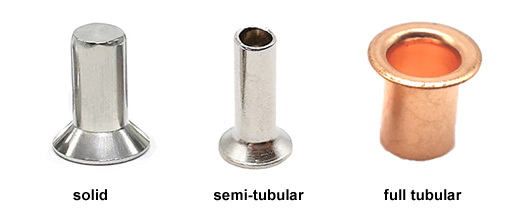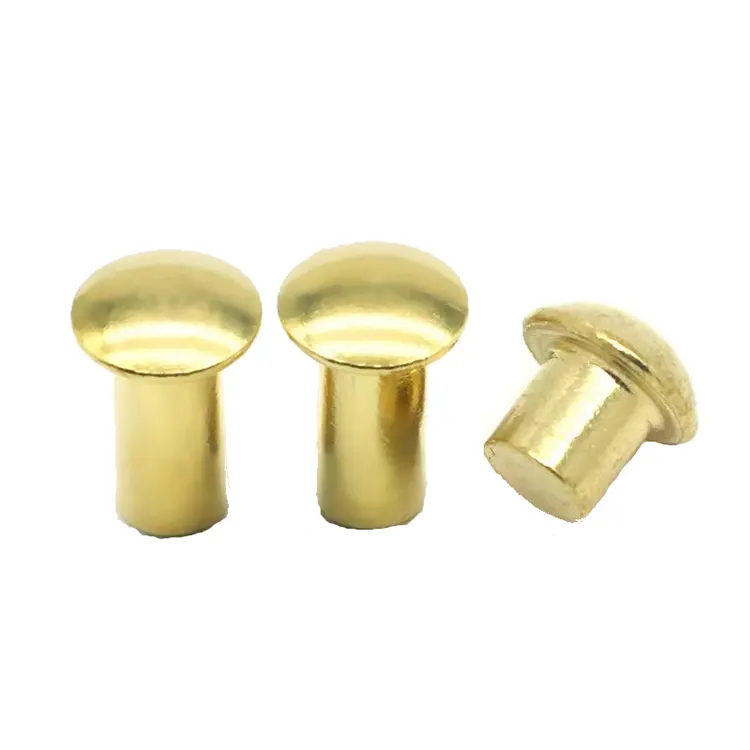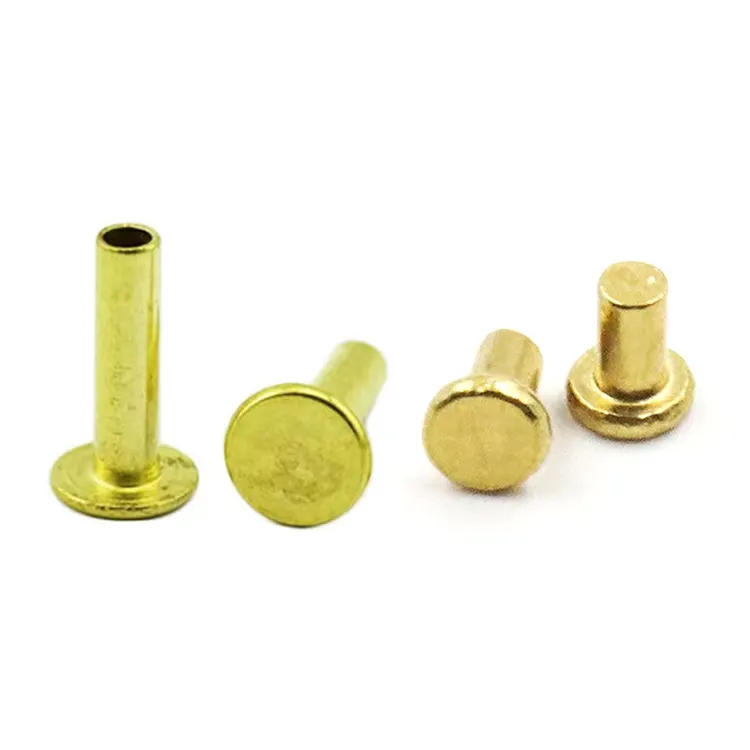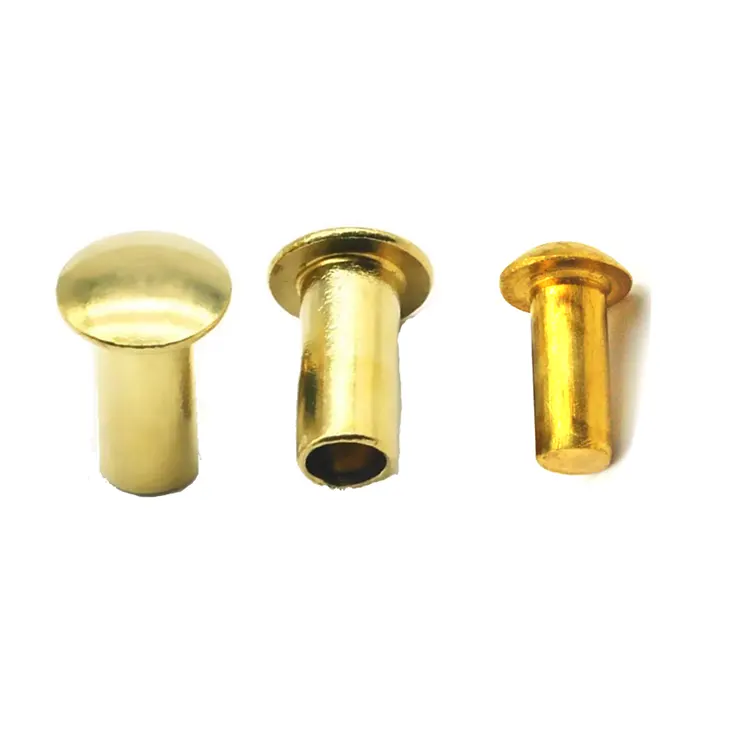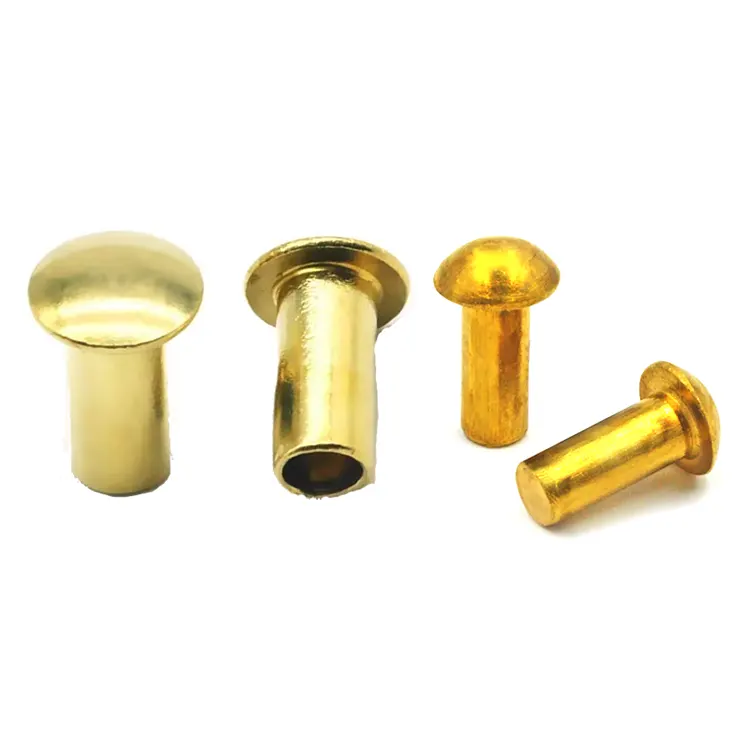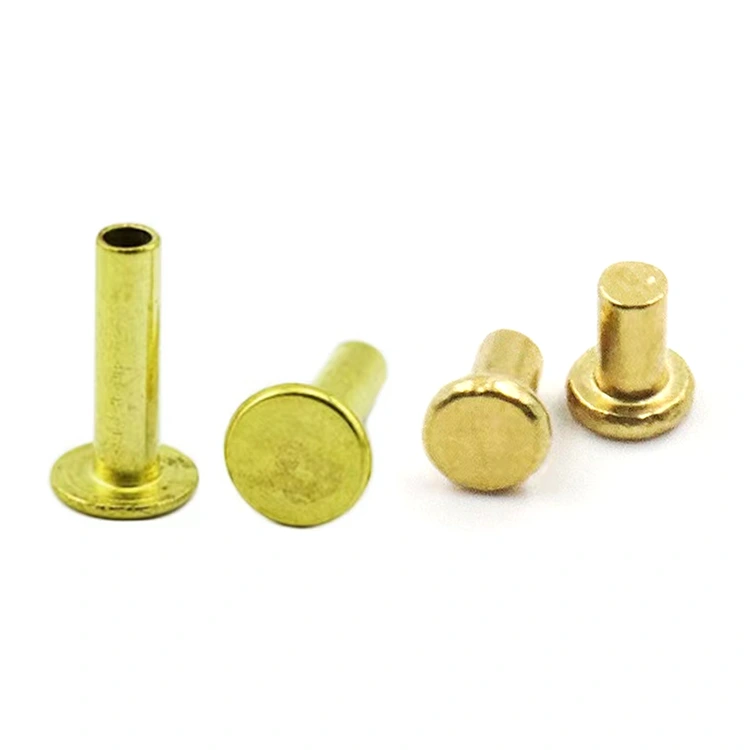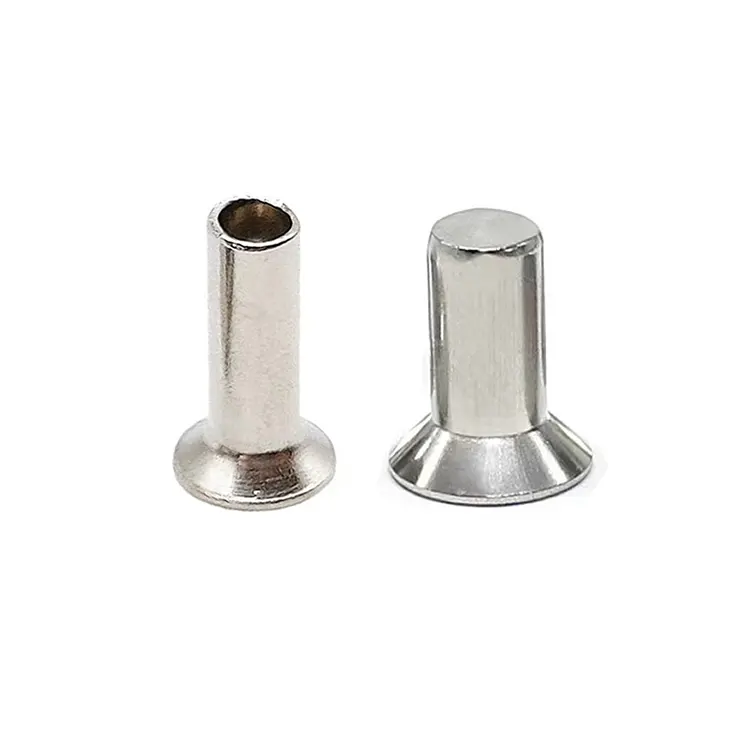Rivetti
As one of professional manufacturer in China, Notin would like to provide you Rivets. And we will offer you the best after-sale service and timely delivery.
What is a rivet?
A rivet is a permanent mechanical fastener used to join two or more materials. Rivets work by inserting a metal pin into an aligned hole and deforming the end, creating a strong, secure, and durable connection. Unlike temporary fasteners like screws, rivets do not rely on threads, but instead form a permanent connection, making them ideal for applications requiring high strength, durability, and vibration resistance.
Classification of Rivets
Rivets are typically categorized by head shape, degree of hollowness, or material.
Based on head shape, rivets can be classified as flat head rivets, round head rivets, countersunk head rivets, mushroom head rivets, universal head rivets, truss head rivets, etc.

Based on degree of hollowness, rivets can be classified as solid rivets, semi-tubular rivets, or full tubular rivets.
Based on material, rivets can be classified as brass rivets, stainless steel rivets, steel rivets, aluminum rivets, copper rivets, etc.
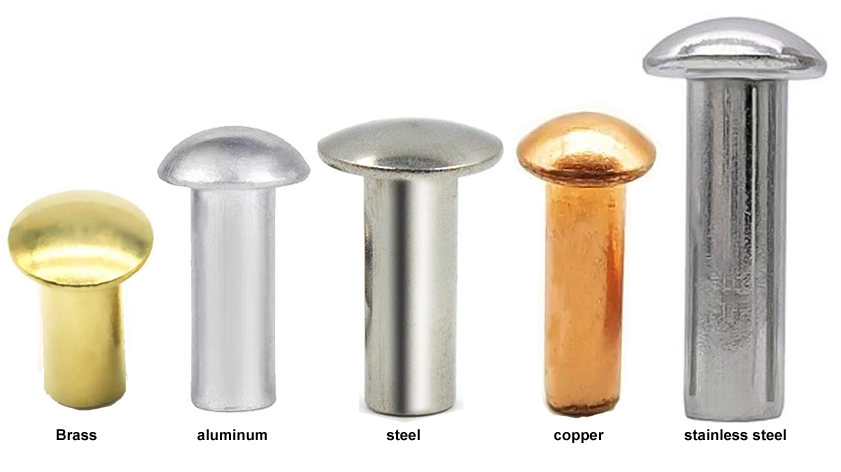
What surface finishes are available for rivets?
Rivet surfaces are typically treated with rust-proofing treatments, primarily electroplating, including zinc plating, nickel plating, chrome plating, tin plating, gold plating, and silver plating. Electroplating is a common rust-proofing method for rivets. It applies a layer of plating to the rivet surface through physical or chemical methods. The plating effectively prevents corrosion and rust, while also providing a certain aesthetic effect.
Another special surface treatment method is head coating. Head coating is performed after the rivet is electroplated. This allows for a variety of colors on the rivet head, achieving an aesthetically pleasing finish.
Aluminum rivets cannot be electroplated, but they can be anodized. Anodizing also allows for a variety of color options, but the unit price is higher than electroplating.
Rust-proofing the rivet surface is crucial, effectively extending the rivet's service life and ensuring a secure connection. Different rust-proofing methods are suitable for different environments and applications, so the choice should be tailored to the specific situation.
- View as
Rivetti a testa tonda in ottone
Nuote Metals è specializzata nella produzione e vendita di rivetti a testa tonda in ottone. Ci troviamo a Dongguan, in Cina, città dal forte sviluppo industriale. I nostri rivetti a testa semirigonfia in rame sono costituiti da un gambo e un cappuccio in lega di ottone. Il design della testa semi-rigonfia fornisce una distribuzione uniforme della pressione, prevenendo danni alla superficie articolare. Sono caratterizzati da conduttività elettrica e resistenza alla corrosione combinate, costruzione semplice, facilità di installazione, elevata affidabilità e lunga durata.
Per saperne di piùInvia richiestaRivetti in ottone
Nuote Metals produce rivetti in ottone in Cina, i rivetti in ottone sono costituiti principalmente da una lega di rame e zinco, un materiale che offre una serie di vantaggi. L'eccellente resistenza alla corrosione dell'ottone gli consente di resistere all'uso a lungo termine in ambienti umidi senza arrugginire, rendendolo adatto per l'uso esterno o in condizioni di elevata umidità. L'ottone possiede inoltre robustezza e durezza, che gli consentono di resistere alle sollecitazioni meccaniche mantenendo una buona tenacità e resistendo alla rottura. L'ottone ha anche un'eccellente conduttività elettrica e termica, che lo rende adatto all'uso in apparecchiature elettroniche e termiche. La superficie liscia dell'ottone consente una facile galvanica o lucidatura, migliorandone l'estetica. Queste proprietà rendono i rivetti in ottone la scelta preferita in molti settori.
Per saperne di piùInvia richiestaRivetti a testa cilindrica in ottone
Nuote Metals è specializzata nella produzione di rivetti a testa bombata in ottone. I nostri rivetti sono realizzati in ottone H65, che ha un alto contenuto di ottone, è morbido e si forma facilmente ed ha meno probabilità di rompersi durante il processo di rivettatura. I rivetti a testa bombata in ottone sono costituiti da una testa e un gambo, con il gambo cavo per circa metà della sua lunghezza. Durante l'installazione, il rivetto viene inserito in un foro preforato. Utilizzando una rivettatrice e un punzone specializzati, l'estremità del gambo si espande e forma la testa sull'altro lato, creando una connessione di bloccaggio. Questo processo si basa sulla deformazione plastica del metallo, eliminando la necessità di saldature o adesivi, rendendolo semplice ed efficiente.
Per saperne di piùInvia richiestaRivetti a testa di fungo in ottone
I rivetti a testa a fungo in ottone sono costituiti da una testa e un corpo. La testa è rotonda e leggermente appiattita, ricorda il cappello di un fungo. Il corpo è semi-cavo, cioè ha un foro al centro ma non lo attraversa completamente. Questi sono chiamati rivetti a testa di fungo semicavi in ottone. Alcuni rivetti hanno un corpo solido, chiamato rivetti a testa a fungo in ottone massiccio. Durante l'installazione, viene utilizzato uno strumento specializzato per inserire il corpo nel foro preforato. Viene applicata una pressione per deformare il corpo, facendolo espandere e afferrare il materiale, creando una connessione sicura. Nuote Metals è specializzata nella produzione di questi rivetti a testa a fungo in ottone.
Per saperne di piùInvia richiestaRivetti a testa piatta in ottone
I rivetti a testa piatta in ottone sono aste metalliche con un cappuccio su un'estremità. Ottengono la rivettatura tramite deformazione o adattamento con interferenza e sono un elemento di fissaggio comune. Il design a testa piatta riduce le sporgenze superficiali, rendendolo adatto per applicazioni che richiedono elevata planarità. La resistenza alla corrosione dell'ottone garantisce stabilità della connessione anche in ambienti umidi e corrosivi. Nuote Metals è specializzata nella produzione di rivetti a testa piatta in ottone. Disponiamo di migliaia di stampi e possiamo produrre una varietà di specifiche di rivetti. Supportiamo anche progetti e campioni personalizzati.
Per saperne di piùInvia richiestaRivetti a testa svasata in ottone
I rivetti a testa svasata in ottone sono costituiti principalmente da una testa e un gambo. La testa svasata consente l'installazione a filo con la superficie del pezzo, eliminando sporgenze che potrebbero influire sull'aspetto o sulla funzione. Il gambo semicavo si deforma durante il processo di rivettatura, ottenendo una connessione. Questo design non solo migliora l'efficienza dell'installazione ma migliora anche l'affidabilità della connessione. Nuote Metals è specializzata nella produzione di rivetti a testa svasata in ottone, che vantano un'elevata precisione e una superficie liscia e priva di graffi. Diamo il benvenuto ad amici provenienti da tutto il mondo per visitare la nostra azienda e collaborare con noi.
Per saperne di piùInvia richiestaWhat are the advantages of rivets over other fasteners?
1. Ease of Installation
Rivets are fast to install, and even fully automated for high-volume applications, resulting in a simple and efficient operation process.
2. Connection Reliability
The riveting process is standardized, with strict quality control, resulting in highly stable connections. Visual inspection allows for quick verification of connection quality.
3. Vibration and Impact Resistance
Rivets connect through deformation or interference fit, providing strong clamping force and excellent vibration resistance, capable of withstanding vibration and shock.
4. Low Cost
Rivets are easy to install and can be fully automated, saving significant labor costs.
What are the advantages and disadvantages of rivets made of different materials?
Aluminum Rivets
Advantages: Lightweight, reduces overall product weight, low cost, suitable for general civilian applications.
Disadvantages: Low tensile and shear strength, unsuitable for high-strength workpieces, prone to electrochemical corrosion when in contact with metals such as stainless steel.
Stainless Steel Rivets
Advantages: Strong corrosion resistance, high hardness, suitable for high-strength workpieces (such as marine equipment)
Disadvantages: Higher cost, typically more expensive than aluminum rivets of the same specification.
Brass and Copper Rivets
Advantages: Excellent conductivity (such as connecting electronic components), good corrosion resistance.
Disadvantages: Higher cost, more difficult to process.
Steel Rivets
Advantages: High hardness, high connection reliability, and wide applicability.
Disadvantages: Compared to other materials, iron rivets are more prone to rusting.
What are the main applications of rivets?
Rivets have a wide range of uses, from small items like a pair of scissors to large items like airplanes and ships, as well as in high-precision medical applications.
Industrial Manufacturing
Rivets are used in a wide variety of industrial fields, wherever there is a need to connect two or more materials.
Electronics
Rivets secure heat sinks and chips, providing both vibration damping and noise reduction, and are widely used in the cooling systems of electronic products such as computers and mobile phones.
Automotive
Rivets are widely used to connect components of automobile bodies and chassis, such as doors and hoods. Their lightweight and corrosion-resistant properties make them an indispensable joining method in automotive manufacturing.
Aerospace
In aircraft manufacturing, rivets are used to connect different fuselage components, such as wings and tailplanes. Millions of rivets create high-strength, corrosion-resistant joints. Aluminum and titanium alloy rivets are often used to connect components of corresponding materials, ensuring stability in extreme environments.
Rivets are used everywhere. The above examples only represent a small number of their applications. We see rivets everywhere in our daily lives, such as on scissors, folding beds, and strollers etc. Rivets can be customized to different sizes and materials depending on the application.
Nuote Metals has specialized in the rivet industry for over a decade. Our factory is located in Dongguan, a city known as the "World Factory," a city with a developed industry and convenient transportation. This allows us to respond quickly when acquiring raw materials and supporting surface treatments, meeting our customers' needs for quick access to samples and bulk orders. We produce 10 million rivets daily and have molds of various specifications, allowing us to produce rivets as small as 0.8mm and as large as 10mm. We welcome your inquiries and visits.






